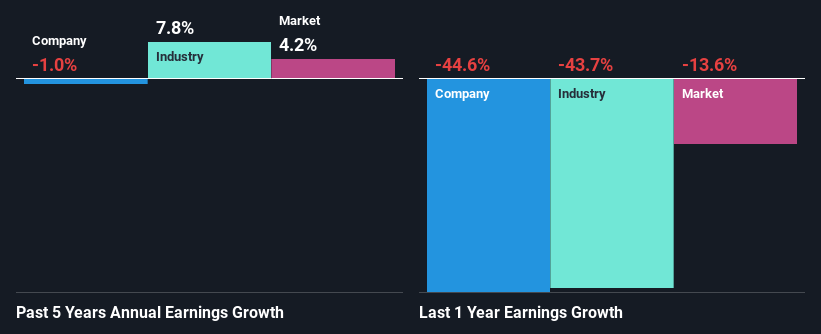The Warehouse Group Limited's (NZSE:WHS) Fundamentals Look Pretty Strong: Could The Market Be Wrong About The Stock?
It is hard to get excited after looking at Warehouse Group's (NZSE:WHS) recent performance, when its stock has declined 31% over the past three months. However, the company's fundamentals look pretty decent, and long-term financials are usually aligned with future market price movements. Specifically, we decided to study Warehouse Group's ROE in this article.
Return on Equity or ROE is a test of how effectively a company is growing its value and managing investors’ money. In simpler terms, it measures the profitability of a company in relation to shareholder's equity.
Check out our latest analysis for Warehouse Group
How Is ROE Calculated?
ROE can be calculated by using the formula:
Return on Equity = Net Profit (from continuing operations) ÷ Shareholders' Equity
So, based on the above formula, the ROE for Warehouse Group is:
11% = NZ$38m ÷ NZ$353m (Based on the trailing twelve months to January 2024).
The 'return' refers to a company's earnings over the last year. Another way to think of that is that for every NZ$1 worth of equity, the company was able to earn NZ$0.11 in profit.
Why Is ROE Important For Earnings Growth?
So far, we've learned that ROE is a measure of a company's profitability. Depending on how much of these profits the company reinvests or "retains", and how effectively it does so, we are then able to assess a company’s earnings growth potential. Assuming everything else remains unchanged, the higher the ROE and profit retention, the higher the growth rate of a company compared to companies that don't necessarily bear these characteristics.
A Side By Side comparison of Warehouse Group's Earnings Growth And 11% ROE
To begin with, Warehouse Group seems to have a respectable ROE. Even when compared to the industry average of 9.7% the company's ROE looks quite decent. Given the circumstances, we can't help but wonder why Warehouse Group saw little to no growth in the past five years. So, there could be some other aspects that could potentially be preventing the company from growing. These include low earnings retention or poor allocation of capital.
We then compared Warehouse Group's net income growth with the industry and found that the average industry growth rate was 7.8% in the same 5-year period.
The basis for attaching value to a company is, to a great extent, tied to its earnings growth. It’s important for an investor to know whether the market has priced in the company's expected earnings growth (or decline). Doing so will help them establish if the stock's future looks promising or ominous. Is Warehouse Group fairly valued compared to other companies? These 3 valuation measures might help you decide.
Is Warehouse Group Making Efficient Use Of Its Profits?
The high three-year median payout ratio of 87% (meaning, the company retains only 13% of profits) for Warehouse Group suggests that the company's earnings growth was miniscule as a result of paying out a majority of its earnings.
In addition, Warehouse Group has been paying dividends over a period of at least ten years suggesting that keeping up dividend payments is way more important to the management even if it comes at the cost of business growth. Existing analyst estimates suggest that the company's future payout ratio is expected to drop to 69% over the next three years. As a result, the expected drop in Warehouse Group's payout ratio explains the anticipated rise in the company's future ROE to 16%, over the same period.
Conclusion
On the whole, we do feel that Warehouse Group has some positive attributes. Although, we are disappointed to see a lack of growth in earnings even in spite of a high ROE. Bear in mind, the company reinvests a small portion of its profits, which means that investors aren't reaping the benefits of the high rate of return. With that said, we studied the latest analyst forecasts and found that while the company has shrunk its earnings in the past, analysts expect its earnings to grow in the future. Are these analysts expectations based on the broad expectations for the industry, or on the company's fundamentals? Click here to be taken to our analyst's forecasts page for the company.
Have feedback on this article? Concerned about the content? Get in touch with us directly. Alternatively, email editorial-team (at) simplywallst.com.
This article by Simply Wall St is general in nature. We provide commentary based on historical data and analyst forecasts only using an unbiased methodology and our articles are not intended to be financial advice. It does not constitute a recommendation to buy or sell any stock, and does not take account of your objectives, or your financial situation. We aim to bring you long-term focused analysis driven by fundamental data. Note that our analysis may not factor in the latest price-sensitive company announcements or qualitative material. Simply Wall St has no position in any stocks mentioned.
Have feedback on this article? Concerned about the content? Get in touch with us directly. Alternatively, email editorial-team@simplywallst.com

 Yahoo Finance
Yahoo Finance 
